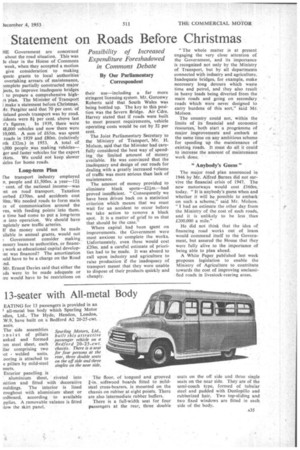Statement on Roads Before Christmas
Page 65

If you've noticed an error in this article please click here to report it so we can fix it.
Possibility. of Increased Expenditure Foreshadowed in Commons Debate
By Our Parliamentary Correspondent
FIE Government are concerned about the road situation. This was ie clear in the House of Commons week, when they accepted a motion give consideration' to making quate grants to local authorities
overtaking arrears of maintenance, :omplete partially constructed major jects, to improve inadequate bridges I to prepare a comptehensive highrs plan. The Minister of Transport I make a statement before Christmas. 4r. Pargiter said that 70 per cent. of inland goods transport was by road. :idents were n per cent, above last
r's figures. In 1939, there were $8,000 vehicles and now there were 10,000. A sum of £65m. was spent roads in 1939 and £80m. (relatively rth £32m.) in 1953.. A total of 1,000 people was making vehiclesger and faster vehicles for the export rkets. We could not keep slower Licks for home roads.
Long-term Plan
['he transport industry employed n, people and £1,500m. a year-12i cent. of the national income—was :nt on road transport. Taxation ;orbed £370m. and accidents cost 50m. We needed roads to form main of communication around the vns, with feeding points into them. e time had come to put a long-term .n into operation. We should have npletely new traffic arteries.
If the money could not be made iilable in annual grants, would not Government consider making easury loans to authorities, or financ; work as educational capital developat was financed? The amortization add have to be a charge on the Road .nel.
Mr. Ernest Davies said that either the ids were to be made adequate or :re would have to be restrictions on their use—including a far more stringent licensing system. Mr. Goronwy Roberts said that South Wales was being bottled up. The key to this position was the Severn Bridge. Air Cdre. Harvey stated that if roads were built to meet present requirements, vehicle operating costs would be cut by 32 per cent.
The Joint Parliamentary Secretary to the Ministry of Transport, Mr. H. MoIson, said that the Minister had carefully Considered the best way of spending, the limited amount of money available. He was convinced that the inadequacy and design of our roads for dealing with a greatly increased volume of traffic was more serious than lack of maintenance.
The amount of money provided to eliminate black spots-421m.—had proved insufficient. "Consequently we have been driven back on a statistical criterion which means that we must wait for an accident to occur before we take action to remove a black spot. It is a matter of grief to us that that should be the case."
Where capital had been spent on improvements. the Government were most anxious to complete the works. Unfortunately, even these would cost £20m. and a careful estimate of priorities had to be made. It was absurd to call upon industry and agriculture to raise production if the inadequacy of transport meant that they were unable to dispose of their products quickly and cheaply.
"The whole matter is at present engaging the very close attention of the Government, and its importance is recognized not only by the Ministry of Transport, but by all departments connected with industry and agriculture. Inadequate bridges, for example, make necessary long detours which waste time and petrol, and they also result in heavy loads being diverted from the main roads and going on secondary roads which were nevet designed to carry burdens of this sort," iaid Mr. Molson,
The country could not, within the limits of its financial and economic resources,both start a programme of major improvements and embark at the same time on any ambitious scheme for speeding up the maintenance of existing roads. It must do all it could to increase the amount of maintenance work done.
"Anybody's Guess"
The major road plan announced in 1946 by Mr. Alfred Barnes did not survive the financial crisis of 1947. The new motorways would cost £160m. today. "It is anybody's guess when and whether it will be possible to embark on such a scheme," said Mr. Moison. "I had an estimate the other day from the Ministry of the cost of such roads, and it is unlikely to be less than £200,000 a mile."
He did not think that the idea of financing road works out of loans would commend itself to the Government, but assured the House that they were fully alive to the importance of being able to plan ahead.
A White Paper published last week proposes legislation to enable the Ministry of Agriculture to contribute towards the cost of improving unclassified roads in livestock-rearing areas.
































































































